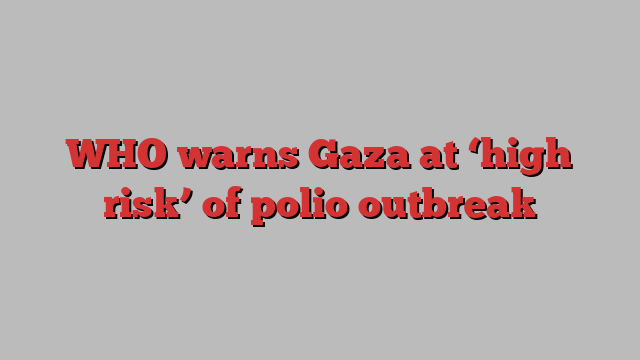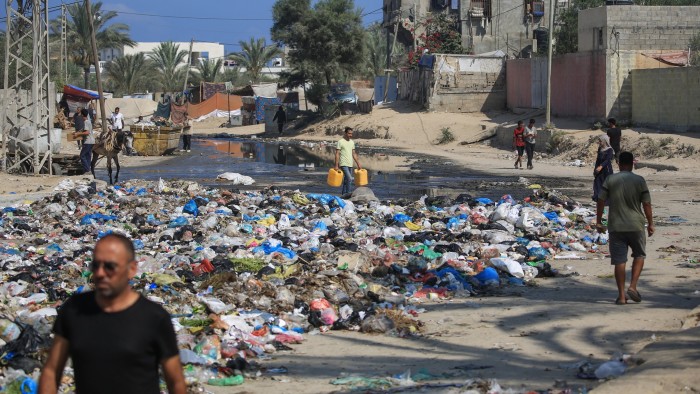
Unlock the Editor’s Digest for free
Roula Khalaf, Editor of the FT, selects her favourite stories in this weekly newsletter.
The World Health Organisation has warned of the “high risk” of a polio outbreak in Gaza, due to catastrophic conditions in the enclave after nine months of war between Israel and Hamas.
Speaking at a briefing on Tuesday, Ayadil Saparbekov, head of the WHO’s health emergencies team, said the organisation had been notified last week that traces of vaccine-derived poliovirus type 2 had been identified in the Deir al-Balah and Khan Younis areas of central and southern Gaza.
“We consider that there is a high risk of the spreading of ‘circulating vaccine-derived polio virus 2’ (cVDPV) in Gaza, and this is not only because of the detection, but also because of the very dire situation with water sanitation,” he said.
Poliomyelitis is highly infectious and can be spread through contact with the faeces of an infected person and by drinking contaminated water. In severe cases, it can cause paralysis or death.

Traces of the virus have been identified in sewage, Saparbekov said, but so far no cases in humans have been detected in Gaza.
The WHO and its partners were carrying out an investigation to identify the source of the virus, and hoped to provide recommendations by Sunday on how to ward off the threat of an outbreak, he said, adding that this could involve a mass vaccination programme.
However, he acknowledged the challenges of such a campaign, given the massive damage that Israel’s offensive in the enclave — which it launched in response to Hamas’s October 7 attack on Israel — has done to Gaza’s health system.
“Primary healthcare services that provide vaccination and other maternal health services . . . [are] basically not functioning. That also brings the risk of spreading the disease across the Gaza Strip and also it may spill over internationally,” he said.
Only 16 of the 36 hospitals that existed in Gaza before the war are functioning even partially, according to the WHO, and only 45 primary healthcare centres — fewer than half the prewar number — were still working.
The Israeli military said on Sunday that it had begun a vaccination programme for soldiers operating in Gaza, in an effort to prevent the disease spreading to Israel.
It added that, since the start of the war, it had brought enough polio vaccines for 1mn of Gaza’s 2.3mn inhabitants into the territory, and was working with various organisations to bring in more.
However, Saparbekov said the dire conditions would make it hard for people to take the precautions needed to prevent an outbreak.
“Given the existing water sanitation limitations and hygiene limitations in Gaza, it will be very difficult for the population to follow the advice to wash their hands and to drink safe water,” he said.
“Unfortunately, the majority who live in shelters with one toilet for 600 people and maybe 1.5 to 2 litres of water per person [per day] will definitely not be able to follow the recommendations that we will be providing.”

